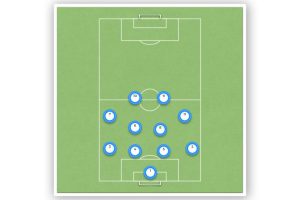Goal-Setting Strategies For Soccer Coaches
As a soccer coach, you know the importance of setting goals for your team. Your players need to have clear objectives and expectations in order for them to reach their full potential. But how do you create effective goal-setting strategies that will help them reach those targets? It can be tricky to craft an approach that works for everyone, but with a few key tips and tricks, you can make sure your players stay on track and keep striving for success.
At the core of any good coaching strategy lies the power of goal-setting. This is because it helps to define what success looks like and provides motivation to keep striving towards it. A good coach will set achievable goals that are challenging yet realistic, as this enables players to feel a sense of achievement when they meet them. It’s also important to break down larger goals into smaller steps so that they are more manageable and easier to track progress along the way.
In this article, we’ll discuss some key strategies for setting effective goals in soccer coaching. From understanding the psychology behind goal-setting, to creating SMART objectives, we’ll cover all the essentials you need to ensure your team stays motivated and focused on achieving its ambitions. So if you’re ready to take your coaching game up a notch, read on!
Benefits Of Goal-Setting
Having discussed the basics of soccer coaching, it is now time to delve into the benefits of goal-setting. Establishing goals for players and teams is a key component to success in soccer. Setting goals helps coaches focus on what needs to be achieved and provides a clear path towards team success. There are numerous advantages to setting goals, including improved individual performance and increased motivation among players.
Goal-setting strategies can help bring out the best in each player by providing specific targets that need to be met. By having an objective to work towards, players will have something to strive for and will remain focused on their development as an athlete. Additionally, if teams set season-wide objectives, it allows them to measure their progress throughout the year, leading to better outcomes in the long run. This also creates a sense of unity among the group as everyone is working together towards achieving those same goals.
Setting goals can be highly beneficial for motivation as well. Knowing that you have something tangible that you’re trying to achieve serves as a constant source of inspiration and encourages players to give their all during practices and games. Furthermore, when goals are reached it gives athletes a feeling of accomplishment which drives them even further towards greater achievements.
Overall, goal-setting is essential for both team success and individual performance improvement in soccer. It helps provide direction while motivating players along the way, making it an invaluable part of any successful coach’s toolkit. Through these strategies, coaches can ensure that they get optimal results from their team while creating an environment where players can reach their full potentials.
Establishing Team Goals
When it comes to soccer coaching, establishing team goals is essential to a successful season. Soccer teams need to have objectives in order to stay focused and motivated, so setting objectives can be the difference between success and failure. It’s important that coaches create attainable goals that challenge their players and encourage them to strive for excellence while also having fun.
One way of doing this is by setting short-term and long-term goals. Short-term goals should be relatively achievable, with rewards or incentives for meeting these goals. This allows players to gain confidence and practice self-discipline as they progress towards the long-term goal. Long-term goals should be more challenging, but still realistic enough that a team will have an opportunity to reach them if they dedicate enough effort over time. It’s also important to track progress towards the team’s objectives throughout the season so that changes can be made when necessary in order for the team to reach its goals.
By creating achievable objectives and tracking progress, soccer coaches can help their teams stay motivated throughout the season while simultaneously preparing them for future success.
Identifying Individual Objectives
Recent studies show that nearly 80% of soccer coaches rate individual player objectives as their number one priority in coaching. Setting individual objectives for each player is critical to achieving team success, as it can help motivate players and create a plan for their development.
As a soccer coach, it’s important to understand your players’ individual performance goals and how they align with the team’s objectives. Establishing specific, measurable expectations for each player allows you to create a clear plan for improvement. This includes setting both short-term and long-term goals to ensure consistent progress towards meeting the team’s overall objectives. To ensure success, coaches should provide frequent feedback on each player’s progress and offer guidance or instruction when necessary.
To maximize team motivation strategies, coaches should also emphasize the importance of personal growth within each player. By providing individuals with achievable goals that are tailored to their needs and abilities, you can increase their confidence while also helping them reach their full potential as part of the team. Crafting an effective player development plan takes time and dedication but is essential for success at any level of competition.
Developing A Plan Of Action
When it comes to developing a soccer coaching plan, action plan development is crucial. It’s important to ensure that all goal-setting strategies are consistent with the overall goals of the soccer team. The most effective soccer coaches understand that each individual objective must be linked to the team objectives. This ensures that players are working together towards a common goal and can become more unified as a team.
It’s also important to create specific measurable outcomes when setting individual objectives. This will enable coaches to easily track progress and identify areas in need of improvement. Additionally, coaches should encourage players to take ownership of their goals and set personal deadlines for achieving them. This allows players to stay motivated and on track with their development throughout the season.
Implementing Strategies
Having worked out a plan of action, it is now time to implement the strategies that will help soccer coaches reach their goals. To make the most of goal-setting techniques and team objectives, there are several steps soccer coaches can take:
- Create individual plans for each player and set specific targets for them to strive towards.
- Monitor progress through regular assessments, such as weekly tests or performance reviews.
- Provide feedback and guidance in order to help players grow and develop.
- Hold players accountable for their actions and celebrate successes along the way.
In order to ensure that these strategies are effective, it is important for soccer coaches to be organized, consistent, and patient with their players. A coach must also remain open-minded and flexible in order to adjust tactics when necessary. By taking a proactive approach to implementing soccer coaching strategies and tracking progress regularly, coaches can effectively reach their desired goals while fostering a positive team culture along the way.
Measuring Progress
Soccer coaches must be able to measure progress in order to accurately assess the effectiveness of their goal-setting strategies. This can be done on both a team and an individual level. When it comes to measuring the progress of a team, coaches should focus on gauging how well collective objectives are being met. Are team members succeeding at their goals? Have they completed tasks that have been established as part of the plan? If not, why not?
For individual players, soccer coaches can track progress by looking at data such as game stats, practice attendance records, and feedback from teammates and opponents. Additionally, coaches should also provide regular verbal and written evaluations to ensure that each player is meeting his or her personal goals. By monitoring these metrics regularly, coaches can make adjustments and course corrections if they see any issues with the team or individual players’ performance. Ultimately, this will help them reach their desired outcome – success on the field!
Adjusting Tactics
Soccer is like life: ever-changing and unpredictable. As a coach, it’s your job to be prepared for anything that comes your way. When it comes to tactics, this means making quick decisions with confidence and clarity when needed.
To ensure you’re well-prepared for any tactical changes that may arise during games, here are five strategies for adjusting soccer tactics:
- Analyze the situation at hand: Before making any drastic changes, take a step back and assess the current flow of the game. Look at the players’ performances and their strengths as well as any potential weaknesses in your strategy.
- Examine the opposing team’s strategy: Understanding what’s working (and not working) for your opponent can help you make informed adjustments to your own tactics.
- Communicate clearly with players: Letting your players know exactly what you expect from them during games will help ensure they understand and follow through with tactical changes quickly and effectively.
- Be flexible: Things don’t always go according to plan on the field, so it’s important to stay open-minded about possible strategic adjustments as the game progresses.
- Think ahead: Anticipate potential issues or opportunities before they happen by staying one step ahead of the game – knowledge is power in soccer!
A successful soccer coach must be able to adapt their coaching strategies quickly and efficiently in order to maximize performance on the field. With practice and preparation, any coach can master these skillful art of adjusting tactics – no matter how challenging or unpredictable things may get!
Celebrating Successes
Once tactics have been adjusted for the team, soccer coaches must shift their focus to goal-setting. Setting team goals and individual objectives is an important element of success on and off the field. Coaches should help players create a plan of action that outlines how they will achieve these goals. This plan should be updated regularly as the season progresses to measure progress and make any necessary adjustments.
It is also essential for coaches to recognize successes, both big and small, along the way. Acknowledging a win or a job well done can go a long way in encouraging players to keep striving for excellence. Celebrating successes with the team can help foster a positive environment that promotes ongoing development and improvement. Additionally, coaches should provide positive feedback when players reach their goals so they are motivated to keep pushing themselves even further.
By setting team goals and individual objectives, providing support, and celebrating successes, soccer coaches can ensure their teams remain motivated throughout an entire season.
Reflection And Refinement
Soccer coaching is like a fine art, and the best way to hone your skills is through reflection and refinement. As a coach, it’s important to take a step back and objectively assess the team’s objectives, plan of action, and individual objectives. It’s essential to have an open dialogue with the players and staff to ensure that everyone is on the same page, working together towards achieving success.
Reflection allows for analysis of goal-setting strategies used by the coach in order to determine what worked well and what could be improved upon. By looking at past performances, you can identify areas where refinement is needed in order to reach higher goals. This process can help build a stronger foundation for future success by ensuring that each team member is clearly aware of their responsibilities and expectations. Additionally, it can help provide focus on individual objectives while keeping sight of the overall team goals.
The process of reflection and refinement should be an ongoing activity that is constantly monitored in order to achieve maximum results from every practice session or game. Through these efforts, coaches can develop better strategies for their teams that will lead them closer to success.
Frequently Asked Questions
What Age Group Should Coaches Focus Their Goal-Setting Strategies On?
When it comes to soccer coaching, understanding the age of your team can be essential for creating effective goal-setting strategies. Coaches need to consider their players’ ages when setting goals in order to ensure that the objectives are achievable. For example, an 8-year-old may not be able to understand and follow complex strategies as a 16-year-old would. Therefore, coaches should tailor their strategies according to the age group that they are working with.
When creating goal-setting strategies for a specific age group, coaches should focus on the abilities and mental capacity of the players. Factors such as skill level, experience, and physical strength all need to be taken into account when developing a goal-setting plan. Additionally, coaches should bear in mind the amount of time available for practice sessions and how this might affect the effectiveness of their strategy. By taking these elements into consideration, soccer coaches can create goals that will motivate their players while also being realistic based on their development level.
It is important for soccer coaches to understand that different age groups require different approaches when it comes to goal-setting strategies. Depending on the level of development and maturity of each player, a coach must adjust his or her strategy accordingly in order to get the best results from their team. It is through this careful consideration of each individual player’s needs and capabilities that coaches can develop successful goal-setting strategies that will help drive their team forward.
Are There Any Specific Techniques To Motivate Players To Reach Their Goals?
When it comes to goal-setting techniques, soccer coaches must be mindful of the motivational strategies they employ. Knowing how to effectively motivate players is key to achieving success in coaching. It’s important for coaches to understand that each player is motivated differently, so a variety of techniques should be used to encourage goal achievement.
There are several motivational strategies that soccer coaches can utilize to help players reach their goals. For example, setting realistic and achievable goals that challenge the player while providing support and guidance along the way is an essential part of keeping players motivated. Additionally, reinforcing positive behaviors through rewards such as verbal praise or recognition can also help maintain focus and inspire sustained motivation. By creating a positive environment conducive to growth, coaches can foster a sense of ownership in their players which will go far in motivating them towards reaching their goals.
As a soccer coach, it’s important to recognize the individual needs of each player and tailor your approach accordingly. By doing so, you’ll ensure that your team has the best chance at meeting their objectives and reaching their goals.
How Can Coaches Ensure That Players Have Realistic Goals?
Motivating players to reach their goals is no easy feat, but with the right approach, coaches can ensure that their players have realistic objectives. Like a ship’s navigator finding the right course to take, coaches must chart the best route for their athletes to achieve success. When it comes to goal-setting, player motivation is key; coaches should provide progress tracking and rewarding successes along the way.
The most important step in this process is ensuring that players have realizable goals. Without a reasonable ambition to work toward, athletes may become discouraged or overworked as they aim too high and exceed their capacity. To prevent this from happening, coaches must assess each individual’s capabilities and create an achievable objective accordingly. This will give them something attainable to strive towards while also allowing them to build on it when they master one level of skill or accomplishment. As such, coaches should act as a guiding light for their players in order to help them reach heights they never thought possible without overreaching themselves.
In order to maximize performance and keep players energized and engaged, coaches need to be mindful at every step of the goal-setting process. From setting realistic targets to providing progress tracking and reward systems for successes, there are many tasks that fall under a coach’s purview in order for players to meet their goals. It’s essential that these objectives are tailored specifically for each athlete, as every player has different abilities and needs. By doing so, coaches can foster an environment of growth and development where everyone has access to the resources necessary for success.
What Methods Can Be Used To Evaluate The Progress Of Players?
Evaluating the progress of players is a key component in player development. Soccer coaches must be able to accurately assess their players’ performance and track their progress in order to ensure that goals are being met. While there are many methods for evaluating individual skill, it is also important to assess overall goal progress as well.
Performance tracking can be done through various forms of testing and assessments, such as fitness tests or standardized soccer tests. Additionally, coaches should consider using video analysis and questionnaires to evaluate the performance of each player. This allows the coach to measure individual skill levels and identify areas of improvement. It also helps them gain a better understanding of how the team has been progressing in terms of meeting goals and objectives.
Overall, assessing the progress of players requires careful consideration from soccer coaches when implementing evaluation techniques. By utilizing a variety of performance tracking methods such as video analysis, questionnaires, fitness tests, and soccer skill assessments, coaches can ensure that they are effectively monitoring their players’ development and working towards achieving set goals.
What Is The Best Way To Reward Successful Players?
Rewarding successful players is an important part of goal-setting for soccer coaches. When players achieve their goals, the coach must find a way to recognize their hard work and dedication. A soccer coach can use many different reward techniques to encourage goal achievement from their team.
One effective reward technique is to give out awards or medals at the end of each season. This serves as a visible reminder that the team has worked hard and achieved success. It also encourages players to strive for excellence and reach even higher goals in the future. Additionally, public recognition of an individual’s accomplishments can be an effective way to motivate them to continue performing at a high level.
Another popular reward method is offering extra privileges or incentives to successful players, such as access to specialized coaching sessions or exclusive practice time with the coach. These rewards are not only motivating, but they can also help to develop skills and build confidence in talented athletes over time. Additionally, coaches should also consider having occasional team bonding activities where they celebrate individual successes and achievements together, such as a pizza party after practice or a game night. This type of reward helps foster team unity and camaraderie while still recognizing individual accomplishments on the field.
No matter what reward technique is used by the coach, it should always be tailored towards encouraging goal-setting rewards and helping soccer players gain greater confidence in their skills and abilities on the field. By rewarding successful players for their hard work and dedication, coaches can provide meaningful recognition that will ultimately serve as motivation for continued growth in soccer performance.
Conclusion
As a soccer coach, it’s important to remember the importance of setting goals for your players. Goals are essential for motivating and encouraging your players to reach their full potential. With careful goal-setting strategies, coaches can ensure that their players have realistic expectations and a clear path to success.
The best way to motivate players is by using specific techniques to help them reach their goals. Coaches should also evaluate progress regularly so they can adjust their strategies if needed. Finally, rewarding successful players is an excellent way to reinforce positive behavior, which will help keep them motivated and on track.
In conclusion, goal-setting strategies are an essential part of any soccer coach’s job. With the right combination of motivation and evaluation, coaches can ensure that their players are achieving their goals and reaching their peak performance levels. After all, isn’t that the goal of every soccer coach?








